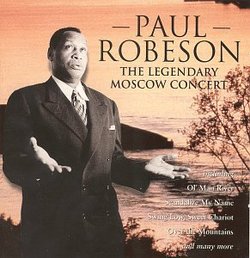| All Artists: Paul Robeson Title: Legendary Moscow Recital Members Wishing: 0 Total Copies: 0 Label: Russian Revelation Release Date: 4/21/1998 Genres: Folk, Special Interest, New Age, Pop, Classical Styles: Vocal Pop, Opera & Classical Vocal, Historical Periods, Baroque (c.1600-1750), Classical (c.1770-1830), Modern, 20th, & 21st Century Number of Discs: 1 SwapaCD Credits: 1 UPCs: 182478336529, 5032636700042, 503263670004 |
Search - Paul Robeson :: Legendary Moscow Recital
 | Paul Robeson Legendary Moscow Recital Genres: Folk, Special Interest, New Age, Pop, Classical
|
Larger Image |
CD Details |
CD ReviewsToo valuable historically not to be in print! Duncan Grover | Lancing, West Sussex United Kingdom | 01/29/2005 (4 out of 5 stars) "Musically, I would say that this live performance falls some way below Paul Robeson's Carnegie Hall album, recorded in 1958. But Robeson's rendition of the final song of this 1949 Moscow recital, 'The Warsaw Ghetto Rebellion', is of such historical importance that it should be considered canonical in any collection Paul Robeson's music. The song, sung by Paul Robeson in Yiddish, commemorates the rebellion of the Jewish inhabitants of the Warsaw Ghetto against the Nazis in World War 2. What was the significance of Paul Robeson singing this song in Russia? During his visit to the Soviet Union, Paul Robeson had managed to meet with his Jewish friend, the poet Itzik Feffer, who was being held in Lubyanka Prison. Knowing that the hotel suite they were in was bugged, Feffer was able to communicate to Robeson by gestures and the passing of notes, the terrible reality of Stalin's purge on Soviet Jews, that the Jewish actor Solomon Mikhoels had already been murdered and that he was likely to suffer the same fate. On the night of the concert, Robeson introduced the song by refering to the cultural importance of Soviet Jews and dedicating the song to Solomon Mikhoels, whose recent death had touched him deeply. This caused gasps amongst the audience - Mikhoels had never officially died but was a disappeared person. Sadly, these remarks were removed from the recording by Stalin's censors. But Robeson's singing of the song itself and the chaotic reaction of the audience afterwards can be heard on this CD. We can hear much of the audience applauding and cheering, whilst others are booing. Of course, the whole incident raises questions as to why Robeson always refused to outwardly criticise Stalin's regime. Nevertheless, here we have a recording of Robeson introducing to the Soviet public arena issues which were not supposed to be talked about, even privately. Ans so I ask the question - how can a CD recording such an outstanding moment be allowed to be discontinued? We need a campaign to get it back in print!"
|

 Track Listings (23) - Disc #1
Track Listings (23) - Disc #1